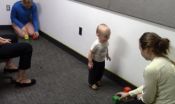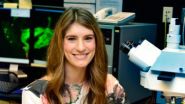(Press-News.org) A couple of years ago a University of Washington researcher who studies how children develop social behaviors like kindness and generosity noticed something odd. The 15-month-old infants in her experiments seemed to be playing favorites among the researchers on her team, being more inclined to share toys or play with some researchers than others.
"It's not like one experimenter was nicer or friendlier to the babies – we control for factors like that," said Jessica Sommerville, a UW associate professor of psychology. She took a closer look at the data and realized that the babies were more likely to help researchers who shared the same ethnicity, a phenomenon known as in-group bias, or favoring people who have the same characteristics as oneself.
"At the time, about half of the research assistants in my lab were Asian-American and the other half were Caucasian, and most of the babies in our experiments are Caucasian," Sommerville said. "We know that by preschool, children show in-group bias concerning race, but results in infants have been mixed."
She and her research team designed a new experiment to test how race and fairness – a social tendency that infants appear to notice – influence babies' selection of a playmate.
The findings, published in the online journal Frontiers in Psychology, show that 15-month-old babies value a person's fairness – whether or not an experimenter equally distributes toys – unless babies see that the experimenter unevenly distributed toys in a way that benefits a person of the same race as the infant.
"It's surprising to see these pro-social traits of valuing fairness so early on, but at the same time, we're also seeing that babies have self-motivated concerns too," Sommerville said.
Forty white 15-month-old babies sat on their parents' laps while watching two white experimenters divide toys between recipients. One experimenter divided the toys equally, and the other experimenter divided the toys unequally, as shown in this video: http://youtu.be/4yFr2wy9Huk.
Later, when the babies had a chance to choose who to play with, 70 percent of the time infants preferred the experimenter who distributed the toys fairly. This suggests that when individuals are the same race as the infant, babies favor fair over unfair individuals as playmates.
Watch an example of a "choice trial," when a baby chose between two experimenters: http://youtu.be/zoclQv8z9oE
Next, Sommerville and her team asked a more complex question. What would happen when individuals who were of the same race as the infant actually stood to benefit from inequity?
In a second experiment, 80 white 15-month-old infants saw a fair and an unfair experimenter distribute toys to a white and to an Asian recipient. Half the babies saw the unfair experimenter give more to the Asian recipient; and the other half of babies saw the experimenter give more to the white recipient
When it came time to decide a playmate, infants seemed more tolerant of unfairness when the white recipient benefited from it. They picked the fair experimenter less often when the unfair experimenter gave more toys to the white recipient versus the Asian recipient.
"If all babies care about is fairness, then they would always pick the fair distributor, but we're also seeing that they're interested in consequences for their own group members," Sommerville said.
The findings imply that infants can take into account both race and social history (how a person treats someone else) when deciding which person would make a better playmate.
"Babies are sensitive to how people of the same ethnicity as the infant, versus a different ethnicity, are treated – they weren't just interested in who was being fair or unfair," said Monica Burns, co-author of the study and a former UW psychology undergraduate student. She's now a psychology graduate student at Harvard University.
"It's interesting how infants integrate information before choosing who to interact with, they're not just choosing based on a single dimension," she said.
Sommerville is quick to point out that her findings do not mean that babies are racist. "Racism connotes hostility," she said, "and that's not what we studied."
What the study does show is that babies use basic distinctions, including race, to start to "cleave the world apart by groups of what they are and aren't a part of," Sommerville said.
INFORMATION:
The study was funded by a Psychology of Character grant from Wake Forest University.
For more information, contact Sommerville at 206-616-3090 or sommej@uw.edu.
Research paper: http://journal.frontiersin.org/Journal/10.3389/fpsyg.2014.00093/abstract
Babies prefer fairness -- but only if it benefits them -- in choosing a playmate
2014-04-14
ELSE PRESS RELEASES FROM THIS DATE:
NASA sees Tropical Cyclone Ita over the Coral Sea
2014-04-14
Tropical Cyclone Ita made landfall in northeastern Queensland, Australia on April 11 as a powerful Category 4 hurricane on the Saffir-Simpson scale, moved south and re-emerged in the Coral Sea on April 14 where NASA's TRMM and NASA-NOAA's Suomi NPP Satellites captured imagery of the weakened storm.
The VIIRS instrument aboard NASA-NOAA's Suomi NPP satellite captured a visible look at Ita's elongating structure on April 14 at 4:12 UTC/12:12. The Visible Infrared Imaging Radiometer Suite (VIIRS) instrument collects visible and infrared imagery and global observations of ...
Website information on colon cancer too complex, fails to address key concerns
2014-04-14
DALLAS – April 14, 2014 – Popular web information on colorectal cancer is too difficult for most lay people to read and doesn't address the appropriate risks to and concerns of patients, a study by UT Southwestern Medical Center gastroenterologists suggests.
In a review of a dozen popular websites, most of the online patient education materials for colorectal cancer screening were written beyond the recommended sixth-grade reading level, while content on the sites failed to address key risks, as well as the barriers to and benefits of screening, according to the study's ...
Beam on target!
2014-04-14
Late on April 1, the crown jewel of the Department of Energy's Thomas Jefferson National Accelerator Facility ("Jefferson Lab") sparkled its way into a new era. Following an upgrade of the Continuous Electron Beam Accelerator Facility, the CEBAF accelerator delivered the highest-energy electron beams it has ever produced into a target in an experimental hall, recording the first data of the 12 GeV era. The machine sent electrons around the racetrack three times (known as "3-pass" beam), resulting in 6.11 GeV electrons at 2 nanoAmps average current for more than an hour.
"This ...
NASA sees remnants of Tropical Depression Peipah over Southern Philippines
2014-04-14
Tropical Depression Peipah has been very stubborn and has moved over the southern and central Philippines bringing clouds, showers and gusty winds. NASA-NOAA's Suomi NPP satellite captured an image that showed Peipah's clouds covering the Visayas and Mindanao regions of the country.
The VIIRS instrument aboard NASA-NOAA's Suomi NPP satellite captured a visible look at the remnant clouds associated with former Tropical Depression Peipah on April 14 at 4:24 UTC/12:24 a.m. EDT. The Visible Infrared Imaging Radiometer Suite (VIIRS) instrument collects visible and infrared ...
Pharmacists can significantly improve blood pressure, cholesterol in stroke patients
2014-04-14
Stroke patients managed by a pharmacist had a 12.5% improvement in blood pressure and low-density lipoprotein (LDL), or "bad" cholesterol levels compared with a control group, according to a clinical trial published in CMAJ (Canadian Medical Association Journal).
Patients who have a stroke or "mini stroke" (transient ischemic attack) are at high risk of adverse cardiovascular events. Management of high blood pressure and cholesterol after a stroke is important because it can substantially reduce the risk of a negative event; however, many patients receive suboptimal care. ...
'MicroRNA' could be key target for bowel cancer treatment
2014-04-14
Scientists found that the molecule, called microRNA 135b, is a vital 'worker' employed by several important cancer genes to drive the growth of bowel cancers.
Drugs targeted at the microRNA could knock out the effects of multiple cancer-causing mutations at once, while tests for it could identify patients with the most aggressive disease, the researchers believe.
The research was carried out by an international team including scientists based at The Institute of Cancer Research, London, the University of Glasgow and Ohio State University in the US.
Scientists tested ...
Study identifies a likely key driver of colorectal cancer development and progression
2014-04-14
COLUMBUS, Ohio – A new study identifies a molecule that is a probable driving force in colorectal cancer and suggests that the molecule could be an important target for colorectal cancer treatment and a valuable biomarker of tumor progression.
The study of microRNA-135b (miR-135b) in two animal models and human tumors was published in the journal Cancer Cell and was led by researchers at The Ohio State University Comprehensive Cancer Center – Arthur G. James Cancer Hospital and Richard J. Solove Research Institute (OSUCCC – James) and at the University of Glasgow in ...
Dietary supplement use among US adults more prevalent than previously thought
2014-04-14
Washington, D.C., April 14, 2014—Dietary supplement use by U.S. adults is more prevalent than indicated by published data from the National Health and Nutrition Examination Surveys (NHANES), according to a new article in the peer-reviewed Journal of the American College of Nutrition (JACN). The review article is based on five consecutive years of online market research studies, conducted by Ipsos Public Affairs for the Council for Responsible Nutrition (CRN).
According to Annette Dickinson, Ph.D., corresponding author and a consultant for CRN, "This new review adds to ...
Young dads at high risk of depression, too
2014-04-14
CHICAGO --- Depression can hit young fathers hard -- with symptoms increasing dramatically during some of the most important years of their children's lives, a new Northwestern Medicine® study has found.
Depressive symptoms increased on average by 68 percent over the first five years of fatherhood for these young men, who were around 25 years old when they became fathers and whom lived in the same home as their children. The results of the study were published April 14 in the journal Pediatrics.
This study is the first to identify when young fathers are at increased ...
Osteoporosis drugs appear to impede cell membrane repair
2014-04-14
AUGUSTA, Ga. –A class of drugs widely used to treat osteoporosis appears to impede a cell's ability to repair a protective outer membrane that helps determine what enters and exits, researchers report.
The inability to quickly repair a membrane is lethal to a cell and may help explain the rare and serious side effect of jawbone destruction that can occur following dental work in patients taking these drugs, said Caroline Lewis, a sophomore at the Medical College of Georgia at Georgia Regents University.
"The bottom line is it inhibits cell membrane repair in two distinct ...





